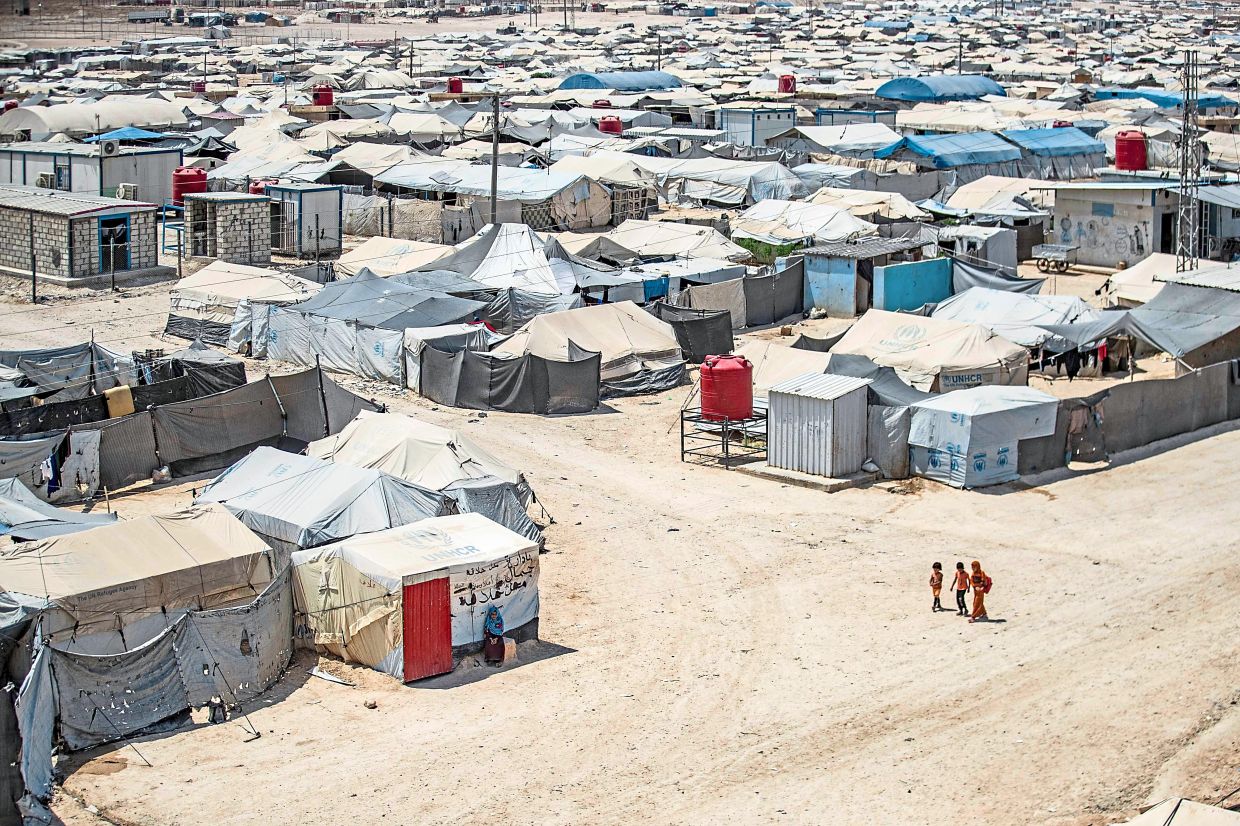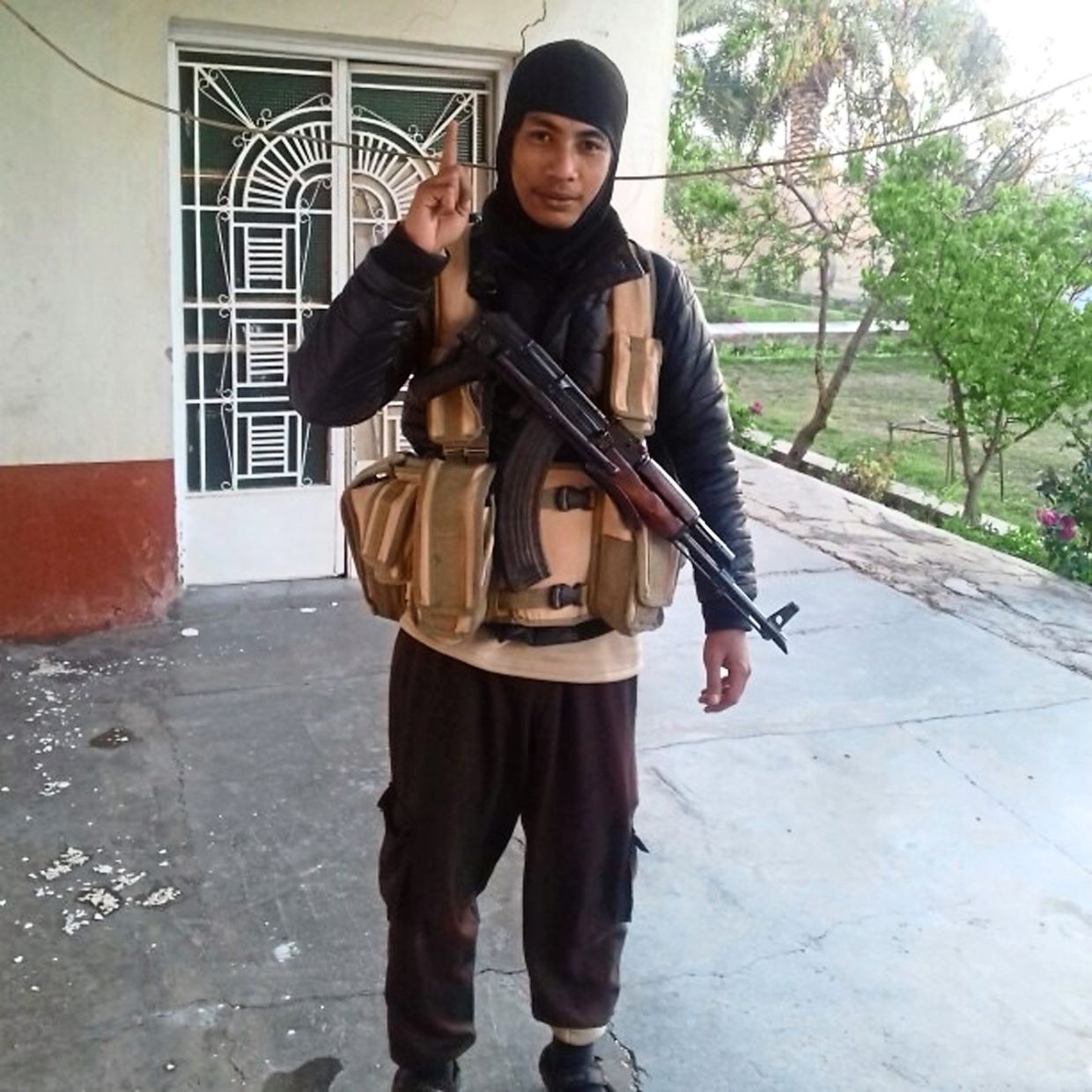
Sheltering an idealogical campaign: The Al-Hol camp, has been described as the ‘most dangerous camp in the world’ with a huge ISIS presence and where radicalistion is believed to be taking place.
KUALA LUMPUR: At the height of the Islamic State’s (ISIS) stranglehold in Iraq and Syria, more than 100 Malaysian fighters joined the so-called holy war, some even with family in tow. Many recorded their fight on social media, too.
But seven years later, following the defeat of the terror group, and with 16 Malaysians repatriated to Malaysia, over 50 fighters and their families remain in refugee camps or have unknown location status.
Bukit Aman has identified 56 Malaysians – 19 men, 12 women, 17 boys and eight girls – who were living in Syrian camps or at large.
Police said 10 women, 12 boys and five girls are living at the Al-Hol refugee camp in north-eastern Syria while nine Malaysian men are in Al-Hasakah prison. One is in prison in Idlib.
Idlib province, which is near the border of Turkey, is in the north-western side of Syria, which has been the scene of many battles.
Al-Hol holds individuals and their families who were in ISIS and until January 2021, it has been reported that the camp’s population was over 60,000, having grown from 10,000 at the beginning of 2019.
It has been reported that there are ISIS militants from more than 50 countries staying at the camp.

Wanndy, who was killed in 2017, was a charismatic leader among Malaysian ISIS fighters.
Described as the “most dangerous camp in the world”, it has a huge presence of ISIS elements and regular killings.
“A major challenge for the authorities is that the Malaysian nationals are held in camps controlled by the Syrian Democratic Forces (SDI), which the Malaysian government does not recognise diplomatically.
“Given that many of these camps have become the hotbed of radicalisation, these unrepatriated individuals could be further radicalised, and later attempt to slip into the country,” said a newly released report.
The report on Malaysia was part of the January 2022 Annual Threat Assessment issued by the Singapore-based International Centre for Political Violence and Terrorism Research of the S. Rajaratnam School of International Studies, Nanyang Technological University.
The US-backed SDI is an alliance of forces comprising Kurdish, Arab, Assyrian/Syriac and several smaller Armenian, Turken and Chechen forces fighting for a secular state, according to a report.
Against this complex background, militants linked to ISIS have also reportedly launched an ideological campaign to persuade these Malaysians living in Syrian camps to fight and re-establish a caliphate in the Middle East.
“The Malaysians, who are staying back, have been brainwashed into believing that the fight isn’t over and that ISIS will make a comeback.
“The ISIS presence in these camps is too strong and radicalisation continues,” said a source.
According to the Centre for Political Violence and Terrorism Research report, at least 48 Malaysians (42 men, one woman and five children) have been killed in Syria.
“The recruitment of Malaysians into Syria has largely dropped in recent years, following the deaths of high-profile Malaysian ISIS fighters and recruiters such as Muhammad Wanndy Mohamad Jedi, Fudhail Omar, Akel Zainal and Muhammad Nizam Ariffin.
“The Malaysian militant landscape, which has traditionally been driven by charismatic individuals such as Wanndy, has remained leaderless since his death, which may explain the general drop in militant recruitment and activity in the country.
“However, the exact numbers and identities of Malaysians still actively involved in militant activities in Syria and other conflict zones remain unknown,’’ it said.
Muhammad Wanndy, also known as Abu Hamzah Al-Fateh, was killed in a drone attack in Raqqa, Syria, on April 29, 2017, and was believed to be the mastermind of several attacks in the region, including at the Movida entertainment centre in Puchong, Selangor, in 2016.
In that incident, two ISIS sympathisers on a motorcycle lobbed a hand grenade into the club, injuring eight.
Muhammad Fudhail @ Abu Qutaibah was killed in an airstrike in 2017 in Raqqa by the Syrian military.
Wan Mohd Aquil Wan Zainal Abidin @ Akel Zainal, who was a rock band drummer, was killed together with his wife and two children, aged two and three, in 2019, in a Russian airstrike on his home in Baghouz, Syria.
Mohd Nizam @ Abu Afghan was killed in Mosul, Iraq, in 2016, during clashes with Iraqi government security forces. He was one of the earliest Malaysian arrivals in Syria.
The CPVTR report added: “With regards to its citizens still in Syria, Malaysia says it will continue to maintain an open-door repatriation policy.
“Some individuals have expressed a willingness to return home, while others have rejected the government’s offer.”
These Malaysians who chose to return will be detained and investigated for potential criminal charges while the women and children will undergo a special assessment by psychologists.
“We will find out why they are in Syria, whether they were forced (to) or joined ISIS.
“If there is sufficient evidence, the women will be charged as well,” intelligence sources said, adding that these were standard procedures.
Since October 2019, Malaysian authorities had been working with foreign agencies to bring back some 40 Malaysians. Their number has slowly decreased.
Two Malaysians, who were accused of travelling to Syria to commit terror acts, have been charged under Malaysia’s Security Offences (Special Measures) Act.
Both men could face up to 30 years in prison if convicted.
The pair were the first Malaysians to be deported from Syria after Turkish troops crossed the border into Syrian territory in October 2019 to go after Kurdish fighters.





